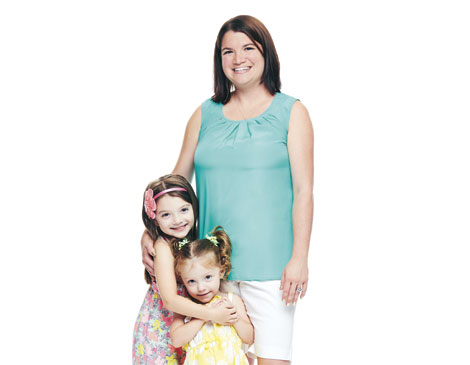Jennifer Mayberry was a high school athlete who watched her diet and stayed active. So despite a family history of hypertension, the Parma native figured her healthy habits could overcome her genetics.
She became a nurse and dreamed of being a mother. But getting there wasn't easy, especially after an initial ectopic pregnancy — where the fertilized egg implants outside the uterus, often in the fallopian tubes. "I almost died," says Mayberry, 31.
So when she and her husband, Jason, received news of a baby on the way four months later, it was thrilling — yet scary. During a doctor's appointment at 36 weeks, Mayberry's blood pressure unexpectedly spiked and labor was induced that day.
"I was far enough along in my pregnancy that it was safe to deliver," says Mayberry, whose daughter Jillian was born May 13, 2010.
When she became pregnant again about two years later, Dr. Steven Weight, director of the division of gynecological surgery at MetroHealth Medical Center, advised a healthy diet and exercise.
"Staying active really helps [keep blood pressure down]," says Weight, who recommends swimming, walking and other lower-impact activities. Likewise, gaining 1/2 to 1 pound per week, for a total of 20 to 35 pounds during the pregnancy, can reduce health problems including higher blood pressure.
"High blood pressure might not be evident right away during a pregnancy," he says. While numbers may elevate a bit during the first trimester, blood pressure usually drops during the second trimester.
Mayberry stayed active and stuck to a low-sodium diet. But at her 20-week checkup, her blood pressure elevated to 140/90. She continued monitoring it at home, but by the 29th week her blood pressure had jumped to 210/110. "I started to see that bottom number get into the 100s and I cringed," says Mayberry, who was prescribed magnesium to prevent seizures and intravenous medications and steroids for her health and the baby's. Yet three days later on Jan. 19, 2013, her daughter was delivered via emergency cesarean section at just 2 pounds, 14 ounces.
"I was scared," says Mayberry. "I thought, How could I fail her? How could I not keep her safe? What was her future going to be?"
Juliana, whose lungs were functioning enough to let out a small cry, was in the neonatal intensive care unit for 10 1/2 weeks. Today, Juliana is a curious 2-year-old. Mayberry had a long road to recovery, too. She spent a full week in the hospital and three months of medication, rest and a careful diet to get her blood pressure in check. Since then, she's gotten involved with Graham's Foundation, a nonprofit for parents of premature babies, and moved to Reynoldsburg, Ohio, where her husband took a job last fall.
"My goal now is to take what I've been through and help others," she says.




